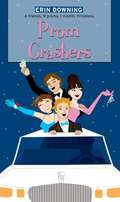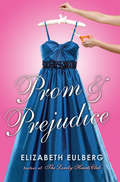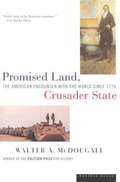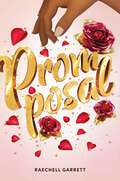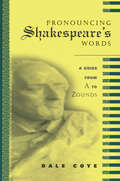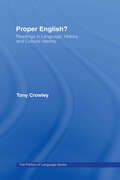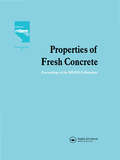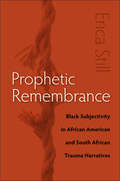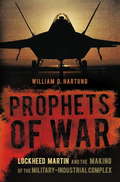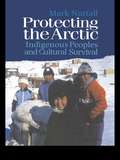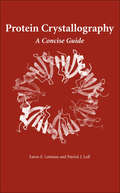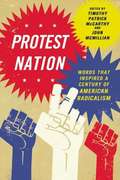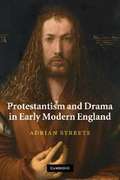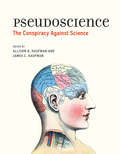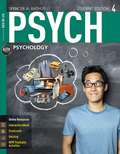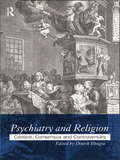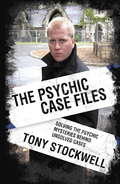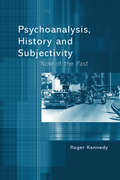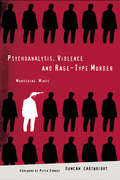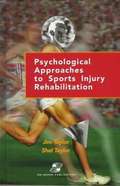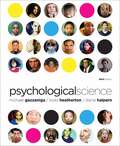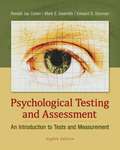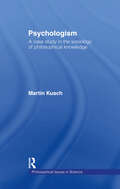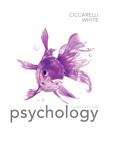- Table View
- List View
Prom Crashers (The Romantic Comedies)
by Erin DowningWill you go to the proms with me? It was love at first sight for Emily and Ethan. But then Em lost his number and, with it, all the hope of finding a real boyfriend before the end of senior year. All she knows about Ethan is his first name, that he has a supercute smile, and that he's going to a prom this month. Which high school? That's anyone's guess.... Em enlists the help of her three best friends, who quickly score formal wear and hail a limo. Together, Emily, Max and Sid vow to find Ethan, to find a cure for senioritis, and most important, to find true love -- one hilarious prom night at a time.
Prom and Prejudice
by Elizabeth EulbergFrom the much-buzzed-about author of THE LONELY HEARTS CLUB (already blurbed by Stephenie Meyer, Lauren Myracle, and Jen Calonita), a prom-season delight of Jane Austen proportions.It is a truth universally acknowledged, that a single girl of high standing at Longbourn Academy must be in want of a prom date. After winter break, the girls at the very prestigious Longbourn Academy become obsessed with the prom. Lizzie Bennet, who attends Longbourn on a scholarship, isn't interested in designer dresses and expensive shoes, but her best friend, Jane, might be - especially now that Charles Bingley is back from a semester in London. Lizzie is happy about her friend's burgeoning romance but less than impressed by Charles's friend, Will Darcy, who's snobby and pretentious. Darcy doesn't seem to like Lizzie either, but she assumes it's because her family doesn't have money. Clearly, Will Darcy is a pompous jerk - so why does Lizzie find herself drawn to him anyway?
Promised Land, Crusader State: The American Encounter With The World Since 1776
by Walter A. McdougallEntertaining, fast-paced, and learned, it exposes the myths that obscure the real meaning of such concepts as American Exceptionalism, Isolationism, Manifest Destiny, Wilsonianism, and Containment. Taking up the torch of George Kennan, McDougall proposes nothing less than to cleanse the vocabulary of our sterile post-Cold War debate on America's role in the world. Looking back over two centuries, he draws a striking contrast between America as a Promised Land, a vision that inspired the "Old Testament" of our diplomatic wisdom through the nineteenth century, and the contrary vision of America as a Crusader State, which inspired the "New Testament" of our foreign policy beginning at the time of the Spanish-American War and reaching its fulfillment in Vietnam.
Promposal
by RaeChell GarrettAn overachiever must decide if risking her heart by working with her former crush turned enemy is worth the reward in this snappy rom-com, perfect for fans of Tweet Cute and The Upside of Falling. High school senior Autumn Reeves has been waitlisted at her dream school. Determined to move to the top of the list, she must find a way to stand out. When a promposal she planned for a friend has half the senior class asking for her help, a brilliant business idea that will look great on her application is born: Promposal Queen. Autumn has no clue how to start a business, so she joins the Young Black Entrepreneurs group and finds herself face-to-face with Mekhi Winston, the boy whose unexpected freshman-year kiss—a kiss that meant everything to her and nothing to him—cost Autumn her best friend. He&’s the only person with the experience to help her, but how can she possibly trust him? With her dreams on the line, Autumn&’s willing to risk it. After all, Mekhi could be a good business partner without being a guy she would ever let near her heart again. But when working with Mekhi jeopardizes her only chance at rekindling a friendship with her ex-best-friend, and secrets long buried threaten to ruin Promposal Queen, another broken heart may be the least of her worries--her entire future is on the line.
Pronouncing Shakespeare's Words: A Guide From A To Zounds
by Dale CoyeFirst published in 2003. Routledge is an imprint of Taylor & Francis, an informa company.
Proper English
by Tony CrowleyFirst published in 1991. Debates about the state and status of the English language are rarely debates about language alone. Closely linked to the question, what is proper English? is another, more significant social question: who are the proper English? The texts in this book have been selected to illustrate the process by which particular forms of English usage are erected and validated as correct and standard. At the same time, the texts demonstrate how a certain group of people, and certain sets of cultural practices are privileged as correct, standard and central. Covering a period of three hundred years, these writers, who include Locke, Swift, Webster, James, Newbolt and Marenbon, wrestle with questions of language change and decay, correct and incorrect usage, what to prescribe and proscribe. Reread in the light of recent debates about cultural identity - how is it constructed and maintained? what are its effects? - these texts clearly demonstrate the formative roles of race, class and gender in the construction of proper ‘Englishness' . Tony Crowley's introductory material breaks new ground in rescuing these texts from the academic backwater of the 'history of the language' and in reasserting the central role of language in history.
Properties of Fresh Concrete: Proceedings of the International RILEM Colloquium
by H. J. WierigThis book presents new information on concrete properties and production in the light of the widespread use of ready mixed concrete and new concreting materials. This book forms the Proceedings of the RILEM Colloquium held in Hanover, West Germany in October 1990. Papers from 18 countries in Europe, North America and the Far East are included.
Property Management (4th edition)
by Walter Roy Huber Arlette Lyons William H. PivarUnderstanding the use and meanings of the terminology found in this textbook is paramount to a successful career in the real estate property management field.
Prophetic Remembrance: Black Subjectivity in African American and South African Trauma Narratives
by Erica StillUsing the term "prophetic remembrance" to articulate the expression of a constituent faith in the performative capacity of language, Erica Still shows how black subjectivity is born of and interprets cultural trauma. She brings together African American neo-slave narratives and Black South African postapartheid narratives to reveal the processes by which black subjectivity accounts for its traumatic origins, names the therapeutic work of the present, and inscribes the possibility of the future. The author draws on trauma studies, black theology, and literary criticism as she considers how writers such as Toni Morrison, Charles Johnson, John Edgar Wideman, David Bradley, Sindiwe Magona, K. Sello Duiker, and Zakes Mda explore the possibilities for rehearsing a traumatic past without being overcome by it. Although both African American and South African literary studies have addressed questions of memory, narrative, and trauma, little comparative work has been done. Prophetic Remembrance offers this comparative focus in reading these literatures together to address the question of what it means to remember and to recover from racial oppression.
Prophets of War: Lockheed Martin and the Making of the Military-Industrial Complex
by William D. HartungEnthralling and explosive,Prophets of Waris an exposé of America’s largest military contractor, Lockheed Martin. When President Dwight D. Eisenhower gave his famous warning about the dangers of the military industrial complex, he never would have dreamed that a company could accumulate the kind of power and influence now wielded by this behemoth company. As a full-service weapons maker, Lockheed Martin receives over $25 billion per year in Pentagon contracts. From aircraft and munitions, to the abysmal Star Wars missile defense program, to the spy satellites that the NSA has used to monitor Americans’ phone calls without their knowledge, Lockheed Martin’s reaches into all areas of US defense and American life. William Hartung’s meticulously researched history follows the company’s meteoric growth and explains how this arms industry giant has shaped US foreign policy for decades.
Protecting the Arctic: Indigenous Peoples and Cultural Survival (Studies in Environmental Anthropology #Vol. 3)
by Mark NuttallProtecting the Arctic explores some of the ways in which indigenous peoples have taken political action regarding Arctic environmental and sustainable development issues, and investigates the involvement of indigenous peoples in international environmental policy- making. Nuttall illustrates how indigenous peoples make claims that their own forms of resource management not only have relevance in an Arctic regional context, but provide models for the inclusion of indigenous values and environmental knowledge in the design, negotiation and implementation of global environmental policy.
Protein Crystallography: A Concise Guide
by Eaton E. Lattman Patrick J. LollThe proteome remains a mysterious realm. Researchers have determined the structures of only a small fraction of the proteins encoded by the human genome. Crystallography continues to be the primary method used to determine the structures of the remaining unknown proteins. This imaging technique uses the diffraction of X-rays to determine a protein’s three-dimensional molecular structure.Drawing on years of research and teaching experience, Eaton E. Lattman and Patrick J. Loll use clear examples and abundant illustrations to provide a concise and accessible primer on protein crystallography. Discussing the basics of diffraction, the behavior of two- and three-dimensional crystals, phase determination (including MIR and MAD phasing and molecular replacement), the Patterson function, and refinement, Lattman and Loll provide a complete overview of this important technique, illuminated by physical insights.The crisp writing style and simple illustrations will provide beginner crystallographers with a guide to the process of unraveling protein structure.
Protest Nation: Words that Inspired a Century of American Radicalism
by Timothy Patrick Mccarthy John McmillianProtest Nation is a dazzling collection of the speeches, letters, broadsides, essays, and manifestos that form the modern-day backbone of the powerful American tradition of activism and struggle. Here are the words from socialists, feminists, union organizers, civil-rights workers, gay and lesbian activists, and environmentalists that have been beacons for millions, reaching from the present and going back through decades of radical thinking and movement-building. Brief introductory essays by the editors provide a rich biographical and historical context for the selections, which include a fiery speech by the great socialist orator Eugene Debs, the original black Panther Party Platform, Harvey Milk's The Hope Speech, and Peter Singer's astonishing treatise on animal liberation. Protest Nation captures twentieth-century American radical thought and action and will both thrill and inspire twenty-first-century readers. Book jacket.
Protestantism and Drama in Early Modern England
by Adrian StreeteContaining detailed readings of plays by Shakespeare, Marlowe and Middleton, as well as poetry and prose, this book provides a major historical and critical reassessment of the relationship between early modern Protestantism and drama. Examining the complex and painful shift from late Medieval religious culture to a society dominated by the ideas of the Reformers, Adrian Streete presents a fresh understanding of Reformed theology and the representation of early modern subjectivity. Through close analysis of major thinkers such as Augustine, William of Ockham, Erasmus, Luther and Calvin, the book argues for the profoundly Christological focus of Reformed theology and explores how this manifests itself in early modern drama. Moving beyond questions of authorial 'belief', Streete assesses Elizabethan and Jacobean drama's engagement with the challenges of the Reformation.
Pseudoscience: The Conspiracy Against Science (The\mit Press Ser.)
by James C. Kaufman Allison B. KaufmanCase studies, personal accounts, and analysis show how to recognize and combat pseudoscience in a post-truth world.In a post-truth, fake news world, we are particularly susceptible to the claims of pseudoscience. When emotions and opinions are more widely disseminated than scientific findings, and self-proclaimed experts get their expertise from Google, how can the average person distinguish real science from fake? This book examines pseudoscience from a variety of perspectives, through case studies, analysis, and personal accounts that show how to recognize pseudoscience, why it is so widely accepted, and how to advocate for real science. Contributors examine the basics of pseudoscience, including issues of cognitive bias; the costs of pseudoscience, with accounts of naturopathy and logical fallacies in the anti-vaccination movement; perceptions of scientific soundness; the mainstream presence of “integrative medicine,” hypnosis, and parapsychology; and the use of case studies and new media in science advocacy.ContributorsDavid Ball, Paul Joseph Barnett, Jeffrey Beall, Mark Benisz, Fernando Blanco, Ron Dumont, Stacy Ellenberg, Kevin M. Folta, Christopher French, Ashwin Gautam, Dennis M. Gorman, David H. Gorski, David K. Hecht, Britt Marie Hermes, Clyde F. Herreid, Jonathan Howard, Seth C. Kalichman, Leif Edward Ottesen Kennair, Arnold Kozak, Scott O. Lilienfeld, Emilio Lobato, Steven Lynn, Adam Marcus, Helena Matute, Ivan Oransky, Chad Orzel, Dorit Reiss, Ellen Beate Hansen Sandseter, Kavin Senapathy, Dean Keith Simonton, Indre Viskontas, John O. Willis, Corrine Zimmerman
Psych 4
by Spencer A. RathusPSYCH 4 maximizes students' effort and engagement by empowering them to direct their own learning, through a single, affordable course solution. PSYCH 4 offers full coverage of course concepts through unique resources and features that mirror the natural study habits of students and that are accompanied by straightforward assignment options for instructors.
Psychiatry and Religion: Context, Consensus and Controversies (Routledge Mental Health Classic Editions Ser.)
by Dinesh BhugraThe argument of this book is that the divide between psychiatry and religion is an artificial one and that there is much room for understanding the same phenomena from different perspectives. In it thirteen senior mental health professionals and pastoral workers come together to explore what their different philosophies have to offer each other for the benefit of the individuals in their care. The book as a whole: * sets the relationship between psychiatry and religion in historical context * provides detailed information about specific religions and the significance of their belief systems for mental health management * examines the relationship between psychopathology, psychiatry and religion.
Psychic Case Files: Solving the Psychic Mysteries Behind Unsolved Cases
by Tony StockwellMissing persons, mystery suicides, haunted houses and murder...Tony Stockwell is regularly asked by victims of crime and their families, to use his psychic powers to help investigate cases, often criminal, that have not yielded to conventional methods. In this fascinating collection, he opens his case files, including: "Suicide or Murder?" in which, at the request of a family, Tony investigates the death of a young boy who was killed in an apparent suicide, which Tony believes involved foul play. In "Missing Children", two children mysteriously disappear while their mother's back is turned. Years later, Tony reads for her and finds a clue to their whereabouts...And many more...This is a treasure trove for anyone who is interested in the realm beyond our own.
Psychoanalysis, History and Subjectivity: Now of the Past
by Roger KennedyClinical psychoanalysis since Freud has put reconstruction of the patient's history at the forefront of its task but in recent years, this approach has not been so prominent. This book aims to explore and re-evaluate the relationship between history and psychoanalysis. Roger Kennedy develops new perspectives on historiography by applying psychoanalytic insight to the key issues of narrative, time and subjectivity in the construction of historical accounts. He also throws new light on the importance of history for and within psychoanalytic treatment. It is argued that human subjectivity is a major element in any historical enterprise, both the subjectivity of the historian or clinician and that of those being studied. Illustrated with clinical examples, Psychoanalysis, History and Subjectivity covers areas such as postmodernism, the nature of memory, clinical evidence and the place of trauma. Psychoanalysis, History and Subjectivity will be of great interest both to professionals in the psychoanalytic and therapeutic fields and to historians.
Psychoanalysis, Violence and Rage-Type Murder: Murdering Minds
by Duncan CartwrightWhat turns an apparently 'normal' individual into a killer?Many people who commit "rage type" murders have no history of violence. Using psychoanalytic theory and a number of case studies, this book isolates key psychological factors that appear to help explain why such acts of extreme violence occur.Starting from a psychoanalytic standpoint, Psychoanalysis, Violence and Rage-Type Murder argues for a pluralistic approach to understanding aggression, and claims that the origins of aggression have no single source or cause. Drawing broadly on psychological, criminological and psychoanalytic research the author outlines the clinical features of the act and explores the possible role that psychopathology and personality might play in the build up to murder. These observations raise a number of questions about the so-called 'normality' of the individual alongside the capacity to commit murder, and how we might understand the stability of such offenders. Psychoanalysis, Violence and Rage-Type Murder will be of great interest to psychotherapists, forensic psychotherapists, psychoanalysts, psychologists, criminologists and health care workers.
Psychological Approaches to Sports Injury Rehabilitation
by Jim Taylor Shel TaylorIn dedicating this guide for rehabilitation specialists, consultants J. Taylor and S. Taylor (U. of Connecticut Health Center, Farmington) refer to frustration and patience as well as to pain and expertise, recognizing that bouncing back from sidelining sports injuries entails mind as well as body. Augmented by celebrity soundbites, the authors detail the referral process for assessing psychological problems; mental influences on rehabilitation (motivation, anxiety, focus); facilitatitive techniques (imagery, using negative thinking positively, pain management, social support); return to the sport; and development of a psychological rehab program (with sample forms, program prescription summaries). Annotation c. by Book News, Inc., Portland, Or.
Psychological Science (3rd Edition)
by Michael S. Gazzaniga Diane F. Halpern Todd F. HeathertonThis edition presents the latest developments in psychology in an engaging, visually stimulating format. The text enhances student understanding and stimulates active learning with Halpern's unique science-of-learning pedagogical system; relevant, real world examples; and an art program tailored especially for visual learners. Instructors and students will benefit from the most integrated media package available for an introductory course.
Psychological Testing and Assessment: An Introduction to Tests and Measurement (Eighth Edition)
by Ronald Jay Cohen Mark E. Swerdlik Edward Sturman.Psychological Testing and Assessment presents students with a solid grounding in psychometrics and the world of testing and assessment. The book distinguishes itself through its logical organisation, readable text, and many pedagogical aids, such as the “Meet an Assessment Professional” feature in every chapter which highlights the works of people such as Dr. Stephen Finn, architect of therapeutic assessment. Now in its eighth edition, this text has consistently won enthusiastic reviews not only for its balance of breadth and depth of coverage, but for content that brings a human face to the assessment enterprise.
Psychologism: The Sociology of Philosophical Knowledge (Philosophical Issues in Science)
by Martin KuschFirst published in 1995. Routledge is an imprint of Taylor & Francis, an informa company.
Psychology
by Saundra Ciccarelli J. WhiteWith its engaging writing style and comprehensive coverage of key research, Psychology, 4/e, awakens students’ curiosity and energizes their desire to learn more. This title draws learners into an interactive experience of psychology. The authors establish clear learning objectives tied to the most recent APA-recommended undergraduate learning guidelines.
